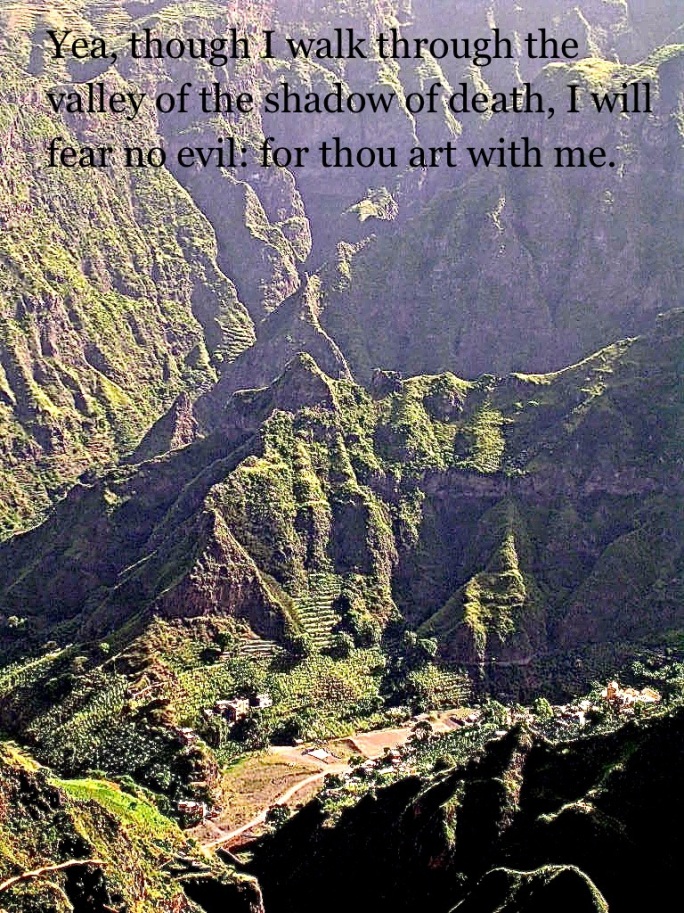
The valley is often a place of loneliness. We may feel that nobody understands exactly how we feel. As we experience sleepless nights, the loneliness and darkness of the night seem to settle like a foggy mist upon us. The hopelessness of our situation paralyzes us . Where can we find hope, comfort and companionship during these dark hours in the valley? The answer is Jesus!
Jesus gives us this promise in Hebrews 13:5: “Let your conversation be without covetousness; and be content with such things as ye have: for he hath said, I will never leave thee, nor forsake thee.” No matter how dark the night, He will not leave us. No matter how deep the valley, He will not leave us. No matter how painful the path, He will not leave us. As we trod through the valley, Jesus promises to walk every step of the way with us!
The valley no longer is a cold, dark, lonely place when we seek after the Lord and become aware of His presence. David faced many valleys in his life. God used the valleys in David’s life to create a longing for fellowship with Him. In Psalm 42, David expresses his longing for God. “As the hart panteth after the water brooks, so panteth my soul after thee, O God. My soul thirsteth for God, for the living God.” (Psalm 42:1-2)
The valley may not be our plan for our lives, but it is God’s plan for our lives. He knows how easy it is for us to drift in our relationship with Him. We can even slowly fall into the sin of the church at Laodicea. This church had become lukewarm because they no longer saw their desperate need for Christ. In our Christian life, there are times when we become lukewarm. The Lord sends us into the valley to restore our passion for Him.
Many of us would say that some of the sweetest times in our lives is our valley experience. Yes, the valley seems painful, lonely, dark and confusing, but it is also quite sweet. It brings us once again to the feet of Jesus. We become broken before our Lord. We don’t pray out of obligation, but out of desperation. We cling to Christ and He takes us unto His bosom and brings great comfort to us.
Christ’s presence changes our whole outlook of our valley. No longer is the valley a place filled with sorrow and bitterness, but a place to accept with joy. How does Christ change our valley from a place of bitterness to a place of sweetness?
1. The valley is a place of darkness, but Christ changes it into a place of light. “I am the Light of the World” (John 8:12)
2. The valley is a place of anxiety, but Christ changes it into a place of peace. “My peace I give unto you.” (John 14:27)
3. The valley is a place of confusion. but Christ changes it into a place of understanding. “And we know that all things work together for good to them that love God, to them who are the called according to his purpose.” (Romans 8:28)
4. The valley is a place of heartache, but Christ changes it into a place of comfort. “Blessed be God, even the Father of our Lord Jesus Christ, the Father of mercies, and the God of all comfort; Who comforteth us in all our tribulation.” (2 Corinthians 1:3-4)
5. The valley is a place of rejection, but Christ changes it into a place of enjoying His love. “For I am persuaded, that neither death, nor life, nor angels, nor principalities, nor powers, nor things present, nor things to come, Nor height, nor depth, nor any other creature, shall be able to separate us from the love of God, which is in Christ Jesus our Lord”
6. The valley is a place of sleeplessness, but Christ changes it into a place of rest. “Come unto me, all ye that labour and are heavy laden, and I will give you rest. (Matthew 11:28)
7. The valley is a place of sorrow, but Christ changes it into a place of joy. “And ye now therefore have sorrow:but I will see you again, and your heart shall rejoice, and your joy no man taketh from you. (John 16:22)
8. The valley is a place of uselessness, but Christ changes it into a place of ministry. “and every branch that beareth fruit, he purgeth it, that it may bring forth more fruit.” (John 15:2)
9. The valley is a place of weakness, but Christ changes it into a place of strength. “And he said unto me, My grace is sufficient for thee: for my strength is made perfect in weakness.” (2 Corinthians 12:9)
“Dear Lord, thank you for making the bitterness of my valley into something very sweet. Thank you for walking through this valley with me. Thank you for allowing me to draw closer to you during this very difficult time. Though this valley is not my choice, your way is always the best. Thank you for not only taking me into the valley, but also through the valley. Your presence has made all the difference! Amen”





